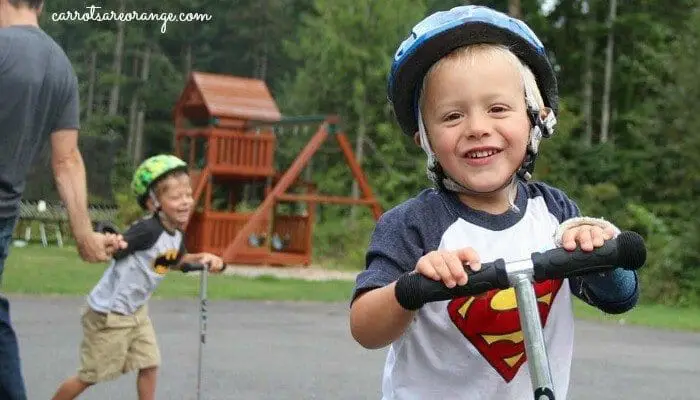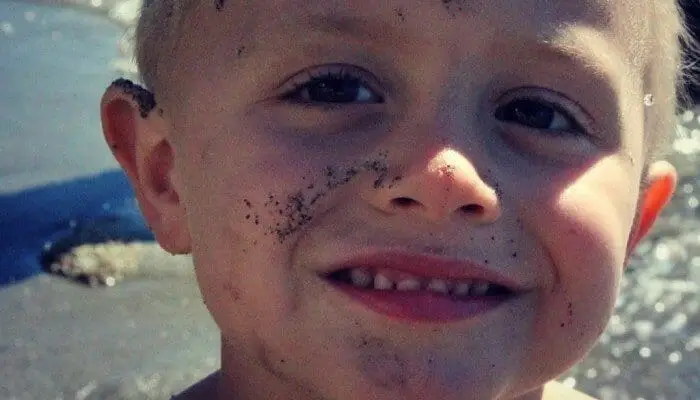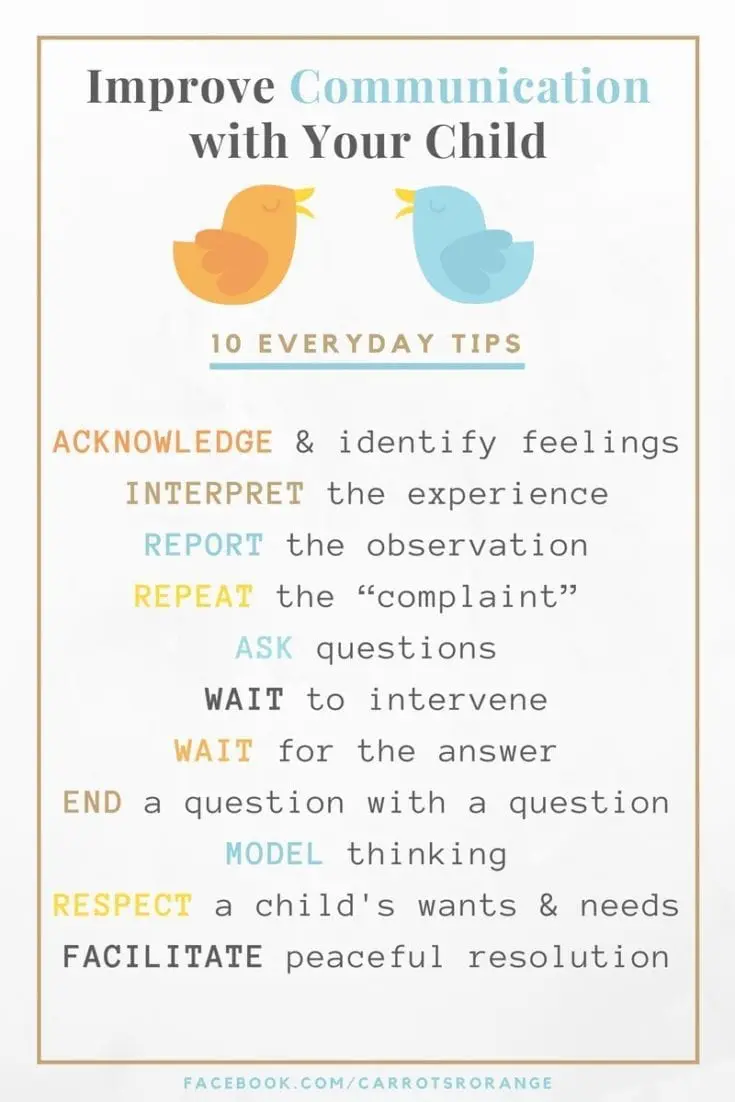Struggling with how to talk so kids will listen is a right of passage for parents and caretakers.
Learning how to improve communication with kids is not simply about getting them to act in a certain way, it is about guiding them to be better communicators, how to live peacefully, how to be kind, and to how to effectively resolve the conflict. This means knowing when to intervene, and knowing how to communicate during a conflict.

Related Post: What Questions to Ask Before You Intervene
How to Talk So Kids Will Listen & Respond
Once you’re done reading this article, you will feel more confident & more prepared to communicate with your child and to help guide your child to be a rock-solid communicator.
I promise. I got your back.
Don’t panic. You are not alone.
This stuff is hard.
Toddler and preschooler communication is challenging for an adult. So, I thought I would share tips on improving communication with young children that I’ve gathered over the years as a parent and educator. This information will hopefully serve as a reference tool for you as you perfect your methods on how to talk so kids will listen, respond, and learn to communicate effectively.
Did you know that toddlers and preschoolers can solve their own problems? Yes, it is true!

“It is the child who makes the man, and no man exists who was not made by the child he once was.”
~ Dr. Maria Montessori
So, just how to talk so kids will listen? Let’s get into it.
With the help and guidance of us grown-ups, who often are too quick to offer solutions without giving children the opportunity to come up with a solution on their own, children just might be able to do it.
They just might surprise us.
How to Talk So Kids Will Listen, Respond, & Learn Effective Communication Skills
The best part is that they can develop important life skills in problem-solving and decision making. Not to mention, they will feel capable and independent.
During my training, I attended a wonderful Montessori presentation by a Virginia Varga. She pioneered the development of a Montessori Infant & Toddler curriculum in the 60s. Her experience with children, toddlers especially, is extensive, to say the least. She passed some of her knowledge on how to talk so kids will listen & learn to communicate effectively onto those of us lucky enough to be in her audience.
In short, she was pretty awesome.
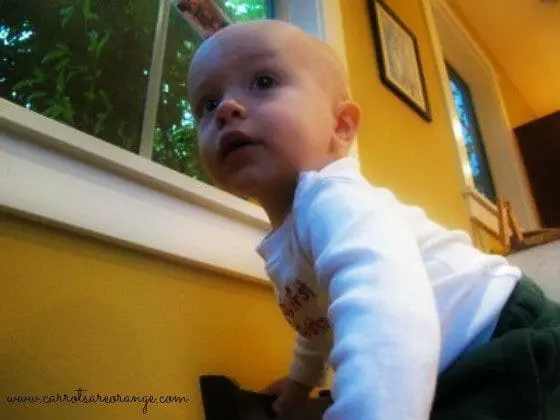
[clickToTweet tweet=”‘Yes, I am a kind, strong, capable person. I can solve problems for myself.’ #parenting” quote=”‘Yes, I am a kind, strong, capable person. I can solve problems for myself.’ “]
I was fascinated with her.
She emphasized that toddlers are in their prime developing a sense of identity and that, by 2 years old, the basic structure of personality is already formed in these little spirits. That is not to say that personality can’t change to some extent but the basic foundation already exists in form. Even at birth, temperament is deeply embedded in who we all are. I
loved it when Virginia said, emphasizing Maria Montessori herself, “already at 3, a child is a little man”. I could not help but giggle a bit thinking about my own children and all their “personality”.
One theme in her Montessori presentation was how parents and educators are too quick to problem-solve for children, that we are given many opportunities to guide them to make decisions on their own but we choose to offer solutions instead of asking questions.
Conflict resolution is a life skill. Helping children understand and process their emotions, and then manage them is a life skill. I am guilty. I am betting I am not alone in this boat.
I got so much out of her talk that I had to share some of the specific communication tactics with you.
10 Ways to Absolutely Improve Communication with Kids
- Acknowledge and identify feelings: “I notice that you are mad. Is that because Ben took the truck away from you?”
- Let’s the child know that his feelings have been heard by us. Recognizing and responding to needs and wants to be expressed through feelings changes a child’s behavior.
- Interpret the experience: “It looks like you both want the truck”
- Let’s the child know that someone understands him, instead of saying “Your brother wants the truck”, offer an interpretation.
- Report the observation: “You would like the truck but Ben took it from you”
- Let’s the child process the situation
- Repeat the “complaint” – “You said the bike is not working”
- Along the same lines as the above two, repeating the complaint not only makes the child feel heard, it also gives adult time to think about next steps.
- Ask questions – “How is it broken?” “Why won’t it go?” What would like to happen now?”
- Asking a question stimulates thinking and reduces stress to the brain allowing for (better) problem solving and decision making. Don’t immediately suggest an option to solve the problem. Allow the child(ren) time to think about how to solve the problem offer solutions and feel capable.
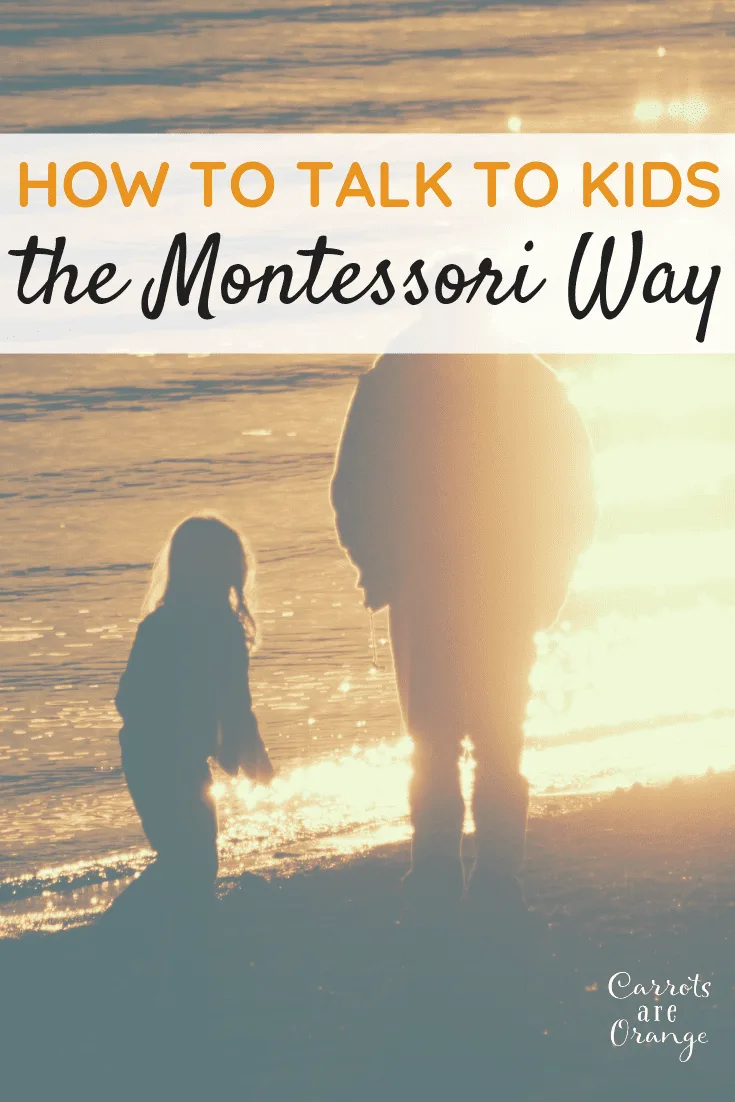
How to Talk to Kids So They Will Listen, Respond & Learn
- Wait for the Answer – Don’t ask a question and then let the child run away or you or the child get distracted by something. Ask the question and wait for and expect an answer. If the child runs away, bring him back into the situation by saying, “I asked XYZ, what is your answer?”
- End a Question with a Question – If you ask the child “Would you like to share the truck with Ben?” and he says, “No”, continue by asking, “How do you think that makes Ben feel?” or “When can Ben play with the truck?”
- Model Thinking – We all sometimes talk to ourselves out loud. Modeling thinking is similar. Say something like, “I think Ben & Ethan will probably find a way to solve the problem.”
- Respect children’s wants and needs– Never force a child to share his things. If he is playing with a truck and his brother takes that truck away, instead of requesting that he share the truck, ask him and if he says, “no”, ask him when he might be ready to share his truck. Children can be very generous when given the opportunity to do so.
- Facilitate peaceful decision-making – Keep the problem within the children. Guide them to solve the problem together. Don’t solve it for them.
How to Better Communicate with Kids
You can not start too young with this approach. The approach takes practice and repetition. Even the youngest child who may not have the words to respond can take words into his world. He understands.
In my Montessori at Home Guide for Parents, I offer loads more helpful tips to add to your toolbox, ready for use!
[clickToTweet tweet=”‘By gently leading a child across the bridge you can celebrate the joy of psychological birth.'” quote=”‘By gently leading a child across the bridge you can celebrate the joy of psychological birth.'”]
I will end with a quote from the presentation: “By following and gently leading the child ‘across the bridge’ you can celebrate the joy of the child’s psychological birth. A child is a person “I am” and “I can”. There is so much more to write on this topic so indeed expect more to come…we can help our children be peaceful and bring peace to their minds and hearts.
Thanks for visiting…come back soon.
I hope we inspired you today!
Marnie
Related Read: The Secret to Positive Discipline – Why Time Outs Aren't Enough
SUBSCRIBE TODAY!
Join over 20,000 parents & educators receiving a weekly dose of Montessori learning, inspiration, parenting love. I promise not to spam you because I am awesome (and clearly so are YOU).

